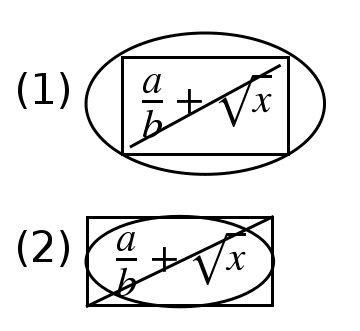- From: Frédéric WANG <fred.wang@free.fr>
- Date: Thu, 22 Jan 2009 21:50:18 +0100
- To: Karl Tomlinson <w3@karlt.net>
- CC: Neil Soiffer <Neils@dessci.com>, www-math@w3.org
- Message-ID: <4978DC0A.6040005@free.fr>
=> Interpretation of "as if the others were not present"
The algorithm proposed was:
1) Compute the least possible size for each notation
2) Compute the maximum of these lower bounds
3) Draw all the notations with this maximum size
So you're right, 2) seems a bit contradictory because the maximum
size depends on each lower bounds. But I think the statement in the
draft should only be understood as:
- the order of notations in the attribute doesn't matter (it was the
starting point of this thread)
- the lower bound in 1) of each notation is computed independently
As I said, steps 2 & 3 are in my opinion necessary to respect rule
of non-nested notation (for a less esoteric example than circle+radical,
see below).
=> Risk of a recursive algorithm
Because each lower bound is computed independently, a recursive
algorithm is not possible in step 1) (and you agree with it). It is
neither the case in 2) (you simply take the maximum of a finite set of
values) nor in 3) (you draw each notation inscribed in a given rectangle
whose size never changes). So I guess your remark is biased by the way
Firefox works. Given a rectangle (or even simply one dimension), Firefox
is able to stretch the characters so that its size will become close to
this rectangle but can not guarantee that the character will exactly fit
the rectangle. This means that for a combination such that "radical
actuarial", 3) is not possible because we always need to readjust the
size of the symbols: Firefox will stretch the radical symbol, then
stretch the parenthesis symbol to cover the height of the radical
symbol, then needs to readjust the size of the radical symbol and so
forth. Of course, in the current version of the patch I cheat and use an
order of priority on the notations to determine which size to take.
However, it should ideally be possible to draw all the notations so that
they are perfectly inscribed in a given bounding box.
=> Treatment of notations
The theoretical mechanism treats all the notations in the same way
but as I said above, the specific treatment I made for radical &
actuarial is due to the limitation of the stretch operation in Firefox.
At the contrary, I think not considering the final size of the menclose
to draw the notation will result in an asymmetry between notations
(again, see the last paragraph).
=> Considering shapes other than rectangles when choosing a size for
notations
If you are able to handle other shapes than rectangle for bounding
area, then it is not too difficult to modify step 1) so that the
computation of the lower bound takes into account the shape of the
enclosed content. I guess your remark refers to our discussion about two
nested <menclose="circle"/>: in this case, if you know that the enclosed
content is an ellipse then you will simply compute a better lower bound
than the one given by the size_of_bounding_box*sqrt(2) but the rest of
the algorithm need not be change.
=> About drawing the notation according to the size of children
So let's consider the example <menclose notation="updiagonalstrike
circle box"/> (see screenshot).
First the lower bounds are computed independently. For example, the
formulae I use are:
- the strike simply takes the size of the content
- the rectangle takes the size of the content + a padding
- the ellipse takes the size of the content * sqrt(2)
But because if we don't take the maximum of the lower bounds before
drawing the notations, the result will be similar to (1), that we would
actually expect for the case of 3 nested <menclose/> elements. So there
is an obvious asymmetry between notations which is a consequence of the
choice way lower bounds are computed. Other implementers may use other
formulae and for instance find that the box is greater than ellipse.
Now if we apply the algorithm of the "maximum lower bounds", the
strike, ellipse and box are all inscribed in a same bounding box (2).
This is the result that I think everybody expect and which is close to
the box+circle example that Neil added in the draft. All the notations
are now considered equivalently and there is no nested notation in an
arbitrary order...
Frédéric Wang
Attachments
- image/png attachment: circle_box_strike.png

Received on Thursday, 22 January 2009 20:53:05 UTC